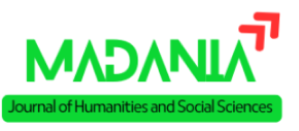Makanan Halal dan Thayyib bagi Kesehatan Siswa Perspektif Al-Qur’an di Madrasah Ibtidaiyah Terpadu Lailatul Qodar
DOI:
https://doi.org/10.59240/kjsk.v5i2.288Keywords:
Halal Food, Halal-Thayyib, Student HealthAbstract
This qualitative study, using a case study method, aims to explore the application of the principles of halal and thayyib foods from QS. Al-Baqarah: 168 regarding students' health at MI Terpadu Lailatul Qodar. Using observation and in-depth interviews, the study focused on the consumption patterns and perceptions held by teachers and students and curricular and extracurricular elements of nutrition literacy, incorporating Qur'anic teachings at MI Terpadu Lailatul Qodar. The results showed that the school gave students halal-thayyib snacks and lunches and had rules against bringing pocket money, which helped stop the everyday unhealthy snacking habits at that age. Teachers think that Thayyib includes nutrition, hygiene, health, and the spiritual side of academics. Students can show that they understand unhealthy food and its risks based on their experiences when there is less formality. Life skills classes like Cooking and Market Day help reinforce these values even more. In fact, problems come from parents who give their kids money and kids who like tasty snacks. This study concludes that while the holistic integration of religious values is effective, strong synergy between the school and family is critical for lasting behavioral change.
References
Aini, Nur. “MENGUBAH PERILAKU JAJAN SEMBARANGAN PADA SISWA SEKOLAH DASAR MELALUI PENYULUHAN KESEHATAN (Changing the Behaviour Street Food Consumption for School Children at Elementary School Klurak Candi Sidoarjo by Health Education).” Journal Nursing Care and Biomolecular 1, no. 1 (2017): 28. https://doi.org/10.32700/jnc.v1i1.7.
Akbar, Mohamed Aslam, and Mohamed Asmy Mohd Thas Thaker. "Pathways to Prosperity: Bridging Faith and Sustainability in Contemporary Consumption Behavior." Islamic Finance and Sustainable Development: Balancing Spirituality, Values and Profit, no. January (2025): 91–112. https://doi.org/10.4324/9781003505570-7.
Ali, Mohd Akil Muhamed, Nurul Syahadah Mohamad Riza, Mohammad Naqib Hamdan, and Mohd Farhan Md Ariffin. "Food Safety in Halalan Tayyiban Discourse According to Mufassirin." International Journal of Academic Research in Business and Social Sciences 13, no. 8 (2023): 210–19. https://doi.org/10.6007/ijarbss/v13-i8/17531.
Amalia, Leily, Oktavianus Para Endro, and Rizal M Damanik. “Preferensi Dan Frekuensi Konsumsi Makanan Jajanan Pada Anak Sekolah Dasar Di Kecamatan Cijeruk,Kabupaten Bogor.” Jurnal Gizi Dan Pangan 7, no. 2 (2016): 119. https://doi.org/10.25182/jgp.2012.7.2.119-126.
Bento, Isabel Cristina, and Luciana Martins Gaudio Frontzek. "Strategies for Healthy Eating Promotion in Childhood: A Reflection." Journal of Childhood Obesity 01, no. 03 (2016): 3–5. https://doi.org/10.21767/2572-5394.100014.
Dewi, Novi Yanti Sandra, and Ahadiah Agustina. "Halalan Toyyiban: Theory and Implementation of Food Products Consumers." Indonesian Interdisciplinary Journal of Sharia Economics (IIJSE) 4, no. 1 (2021): 179–89. https://doi.org/10.31538/iijse.v4i1.1425.
Eka Nurani. Wawancara dengan penulis. MI Terpadu Lailatul Qodar, Sukoharjo, 6 Mei 2025.
Fitriani. “Konsep Makanan Halalan Thayyiban Dalam Qs. Al-Baqarah : 168 Perspektif Quraish Shihab Dan Ilmu Kesehatan.” Nihaiyyat: Journal of Islamic Interdisciplinary Studies 1, no. 1 (2022): 73.
Handayani, Puspita, Galuh Ramana Hanum, Supriyadi Supriyadi, Muhammad Bagas Mahaputra, and Ario Khairul Habib. "Enhancing School Canteen Practices: A Catalyst for Healthier and Ethical Student Snacking." Indonesian Journal of Cultural and Community Development 14, no. 2 (2023): 6–14. https://doi.org/https://doi.org/10.21070/ijccd.v14i2.967.
Haroen, Hartiah, Neti Juniarti, Citra Windani Mambang Sari, Witdiawati Witdiawati, and Adelse Prima Mulya. “Program Kitasuka (Kesehatan Gigi Dan Kesehatan Anak Paud) Sebagai Upaya Peningkatan Perilaku Hidup Bersih Dan Sehat Di Rancaekek.” Jurnal Kreativitas Pengabdian Kepada Masyarakat (PKM) 7, no. 8 (2024): 3373–78. https://doi.org/10.33024/jkpm.v7i8.15133.
Harvey, Graham. "Religion and Food, Religions as Foodways." Rever 15, no. 1 (2015): 80–92.
Hetty Wiastuti. Wawancara dengan penulis. MI Terpadu Lailatul Qodar, Sukoharjo, 7 Mei 2025.
Jackson, Jennifer A, Adam Branscum, Deborah John, and Ellen Smit. "Healthy Eating, Physical Activity, and Learning Behaviors," 2015, 24–34.
Kasingku, Juwinner Dedy. “Peran Makanan Sehat Dalam Meningkatkan Kesehatan Fisik Dan Kerohanian Pelajar.” Jurnal Pendidikan Mandala 8, no. 3 (2023): 853–59. http://ejournal.mandalanursa.org/index.php/JUPE/index.
Lavriša, Živa, and Igor Pravst. "Marketing of Foods to Children through Food Packaging Is Almost Exclusively Linked to Unhealthy Foods." Nutrients 11, no. 5 (2019). https://doi.org/10.3390/nu11051128.
Lonto, Jesica S., Adrian Umboh, and Abram Babakal. “Hubungan Pola Asuh Orang Tua Dengan Perilaku Jajan Anak Usia Sekolah (9-12 Tahun) Di Sd Gmim Sendangan Sonder.” Jurnal Keperawatan 7, no. 1 (2019): 1–7. https://doi.org/10.35790/jkp.v7i1.24338.
Mahmood, Lubna, Paloma Flores-Barrantes, Luis A. Moreno, Yannis Manios, and Esther M. Gonzalez-Gil. "The Influence of Parental Dietary Behaviors and Practices on Children's Eating Habits." Nutrients 13, no. 4 (2021): 1–13. https://doi.org/10.3390/nu13041138.
Marzband, Rahmatollah, Mostafa Moallemi, and Morteza Darabinia. "Spiritual Nutrition from the Islamic Point of View." Journal of Islamic Studies and Culture 5, no. 2 (2017): 33–39. https://doi.org/10.15640/jisc.v5n2a4.
Maula Nisa Jamila. Wawancara dengan penulis. MI Terpadu Lailatul Qodar, Sukoharjo, 7 Mei 2025.
Mausufi, Nurul, Muhammad Hidayat, and Fitriani Fitriani. “Makanan Halal Dan Thayyib Perspektif Mufassir Nusantara.” Ahkam 2, no. 3 (2023): 509–26. https://doi.org/10.58578/ahkam.v2i3.1410.
Minton, Elizabeth A., Hu Jeffrey Xie, Eda Gurel-Atay, and Lynn R. Kahle. "Greening up Because of God: The Relations among Religion, Sustainable Consumption and Subjective Well-Being." International Journal of Consumer Studies 42, no. 6 (2018): 655–63. https://doi.org/10.1111/ijcs.12449.
Muhammad Miftah. Wawancara dengan penulis. MI Terpadu Lailatul Qodar, Sukoharjo, 6 Mei 2025.
Muhmamad Zakky. Wawancara dengan penulis. MI Terpadu Lailatul Qodar, Sukoharjo, 7 Mei 2025.
Observasi MI Terpadu Lailatul Qodar. 5 Mei 2025.
Observasi MI Terpadu Lailatul Qodar. 6 Mei 2025.
Observasi MI Terpadu Lailatul Qodar. 10 Mei 2025.
Pilin, Pilin, Purwani Pujiati, and Herjani Herjani. “Pengetahuan Ibu Tentang Makanan Bergizi Dan Pemberian Makanan Pendamping ASI (MP-ASI) Berhubungan Dengan Kesehatan Bayi Usia 6-12 Bulan Di Puskesmas Serimbu Kabupaten Landak Tahun 2021.” SIMFISIS Jurnal Kebidanan Indonesia 2, no. 2 (2022): 303–8. https://doi.org/10.53801/sjki.v2i2.83.
Ramadani, Fachmi, Fathul Jannah, and M. Arsyad. “Hubungan Konsumsi Fast Food Dengan Kejadian Obesitas Pada Siswa SMA Negeri 3 Subang Dan Tinjauannya Menurut Pandangan Islam.” Junior Medical Journal 1, no. 7 (2023): 923–31.
Reza Al Hikam. Wawancara dengan penulis. MI Terpadu Lailatul Qodar, Sukoharjo, 7 Mei 2025.
Salamon, Hussin Bin. "Halalan Tayyiba: An Islamic Perspective on Healthy Food." Revista Gestão Inovação e Tecnologias 11, no. 2 (2021): 1001–14. https://doi.org/10.47059/revistageintec.v11i2.1732.
Siti, Siti Salwa, Mohd Al ikhsan Ghazali, Mohd Burhan Ibrahim, and Nurul Izzah Mustapha. "Evidence Based Review on the Effect of Islamic Dietary Law towards Human Development." Mediterranean Journal of Social Sciences 6, no. 3 (2015): 136–41. https://doi.org/10.5901/mjss.2015.v6n3s2p136.
Sumiati, Iis, Neneng Windayani, and Ade Yeti Nuryantini. "Exploration the Concept of Thayyiban Halal Food in the Primary School Environment: A Study of Students' Halal Literacy." Journal of Halal Product and Research 7, no. 1 (2024): 91–103. https://doi.org/10.20473/jhpr.vol.7-issue.1.91-103.
Supu, La, Endang Jayanti Rumayomi, and Rizqi Alvian Fabanyo. “EDUKASI DAN TEST FORMALIN, ZAT PEWARNA, DAN BORAKS (NATRIUM TETRABORAT) PADA MAKANAN JAJANAN ANAK SEKOLAH DASAR NEGERI 36 PERUMNAS DAN SEKOLAH DASAR MORIA KOTA SORONG.” [JURNAL KREATIVITAS PENGABDIAN KEPADA MASYARAKAT (PKM) 7, no. Table 10 (2024): 4–6. https://doi.org/https://doi.org/10.33024/jkpm.v7i1.12870.
Downloads
Published
How to Cite
Issue
Section
License
Copyright (c) 2025 Daryanto, Rina Tri Handayani, Imam Tobroni, Sahal Abidin, Amalia Nurul Fatimah, Muhamad Fauzan Aminudin

This work is licensed under a Creative Commons Attribution-NonCommercial-ShareAlike 4.0 International License.






